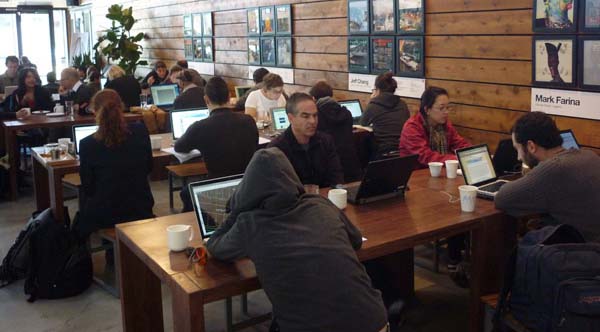A few weeks ago I wrote an article about our relationship with information technology for the Matador Network that I thought would be worth sharing here. I find that there is a bit of a taboo we all impose on ourselves when it comes to looking at the use of digital media and endless gadgets with a critical eye, because hey, we’re all on Google, Facebook, Twitter and any number of other hyper connectivity media, so it must be hypocritical to question any parts of it.
Browse. Not too often. Mostly meaningful information.
As a result, we’re allowing ourselves to be fed an ever-growing digital diet, aided by an industry whose profits are driven by creating ever new ways for us to click on things, more and more of them intellectually nutrient-free. My analogy is the food industry that realized at some point it could only sell more product if it found ways to increase portions, so it went to “supersizing” everything.
This is not an anti-tech rant, but an attempt to spark a nuanced conversation with ourselves and each other as to which parts of our digital intakes are nourishing and which ones are just empty calories.

What’s the best thing you’ve ever experienced that you COULDN’T find online?
My first encounter with a mobile phone was on a day in the not-too-distant past when my friend picked me up to go to Ocean Beach in San Francisco. After soaking in the sunshine for a couple of hours, we returned to her car parked along the Great Highway. That’s when opportunity came knocking. Or so I thought.
I recognized the battery-dying sound of the engine turning over ever so faintly from my old VW Bus days, and I envisioned past trips when a breakdown by the side of the road had invariably led to an unforgettable adventure. Like the time when a horde of barefooted strangers jumped out of a van to help me and my friends push the bus through the snow to a hot spring in the Eastern Sierra Nevada. The all-nighter we spent dancing in a Motel 6 room due to a broken accelerator cable. Or the wicked funny mechanic dude with the taco grill in his Mojave desert repair shop. You know, unchoreographed divine interventions.
My heart began to beat just a little faster as I was contemplating which direction we would walk to find help and what kind of a good Samaritan we might encounter. But it immediately sank when my friend pulled out her shiny new mobile phone to call roadside service from inside the car. Yes, the tow truck arrived within 30 minutes to jump start us. Yes, we had a nice conversation sitting there, waiting. Yes, everything went smoothly, the way it’s supposed to. Yes, we never had to leave the car. And yes, that was the problem.
It was hard to imagine back then that barely a decade later the practice of asking a stranger for help or directions would have become almost completely obsolete in some parts of the world, an anachronism from a bygone age. These days, with every last shred of information under the sun at the tip of our fingers, the conventional wisdom — especially in the super-wired Bay Area — is that the quicker and more conveniently you can find out what you need to know and get to where you need to be, the more successfully or even happily you will navigate through life. Google, Apple, Foursquare & Co, for their part, are making sure that no kernel of data they can glean from our devices to predict our next thought — or rather, purchase — is left unanalyzed, as they are “trying to solve the problem of telling people what they need to know before they need to know it.”
Read the whole story








I have to tell you, I am in the process of drafting a piece for my blog that essentially states, “I am rejecting social media.” I’ve come into 2014 noting what has been working in my life and business and what has not, and it’s time to accept that this current technology infatuation does not work for me.
For the past two years, coming up with a social media marketing plan has sat on my things to do list unaddressed. I take stabs at it, have sat through professional classes about it, and have heard the relentless messages that say I must be engaged to it in order to be successful. Looking back, I was the one who was telling my entrepreneurial friends that they should be paying attention to this Facebook thing. Now I’m praying for things to change.
Meanwhile, I’m still carrying a Tracphone flip phone — one I bought when payphones disappeared and it became taboo to ask to use a phone. I find myself hiding it in embarrassment, which is silly, because the darn thing works great.
Your post has renewed my courage in “coming out” about my odd position. I love the humor in it, too. So here I am, reaching through the technological lines, smiling, wondering where real life will take me next.
Hi Ruth, I think we’re all struggling with how to keep the faucet of information pressure at a manageable flow. I think the very concept of a “social media marketing plan” shows how weird this whole thing has become. While being social used to be just something we did because we’re, um, human, these days there seems to be an ulterior motive behind even the most minute interactions we have. I find myself increasingly numbed and bored when perusing Facebook or Twitter streams. Incidentally, I just finished reading The Circle by Dave Eggers, a fictitious account about a mega corp in the vein of Google/Facebook/Twitter that has turned the world into a place where privacy is considered theft. Reading this essay by Mark Zuckerberg’s sister, it occurs that we’re really not so far away from this vision/nightmare where every thought anyone ever has is being broadcast live… http://ideas.time.com/2013/10/23/randi-zuckerberg-post-more-baby-photos/